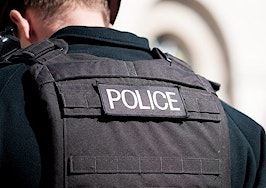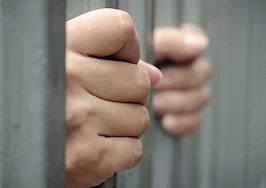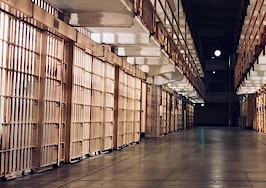A federal jury on Thursday convicted former real estate guru Rick Koerber of defrauding clients of $47 million through an alleged ponzi scheme in a bid to bankroll a lavish lifestyle that included the production of a panned 2009 horror flick, a burger franchise and a fleet of Ferraris.
Following three days of deliberation, Koerber, who at one time held $7,000 real estate seminars, was found guilty on 15 counts of fraud, including wire fraud, fraud, and money laundering. The Utah District Court jury found Koerber not guilty on two counts of tax evasion. A final charge was thrown out at the onset of the trial, according to Salt Lake Tribune reporter Jessica Miller.
Koerber will remain free until his Jan. 21 sentencing.
The decision signals the end of a nine-year ordeal that began in 2009 with Koerber’s indictment on 18 charges, all later dropped after the proceedings languished outside of court for five years, violating the defendant’s right to a speedy trial. In 2017, a new case against him ended in a mistrial following seven days of jury deliberation that concluded in a hung jury.
Federal prosecutor Tyler Murray charged in the latest trial that Koerber lured investors with the promise of real estate riches, but ultimately funneled his backers’ money into a series of extravagant purchases, including sports cars, a local Iceberg fast-food drive-in and the production of the 2009 slasher flick Evil Angel, described on Internet Movie Database as a tale of an ancient demon haunting a young paramedic in Chicago.
In his closing arguments, Murray accused Koerber of deploying a “bait and switch,” adding that the defendant characterized his business as successful despite making no money, according to the Salt Lake Tribune. “Everyone was attracted to the promise of a high return,” Murray said. “The reality was those returns were a fraud.”
During testimony in the 2017 trial, investors said they believed three- to five-percent returns on their money were coming from profits from real estate purchases made by Koerber’s ventures. Instead, Koerber was allegedly paying old investors off with funds from new investors.
Prosecutors claim he accepted $100 million in investment money, or what he characterized as loans, from Salt Lake City residents.
Taking advantage of his high-profile platform, Koerber charged $7,000 for seminars on his so-called “equity mill” business model, about which details remain vague. The self-described real estate guru claimed to have invested in single-family homes that he rented or sold for profit.
By the time home prices collapsed in 2007, prosecutors claim Koerber owed $47 million to the people who put money into his “equity mill.”
Prosecutors also allege the investors funds went to purchases that benefited Koerber. Koerber allegedly bought multiple Ferraris that his lawyer claimed he later resold for profit. Federal investigators, meanwhile, said he purchased a local “Iceberg Drive Inn” fast food franchise with his investment funds. According to media reports, he initially paid his attorney Marcus Mumford with a title to the franchise.

The Iceberg Drive Inn
However, it was “Evil Angel” that raised some eyebrows, including in court. When a trailer for the gory movie was played for jurors during the trial, Koerber’s wife reportedly dragged her children from the courtroom.
The director of the film, Richard Dutcher, testified last year that a goal of his was to tell the 1830s western-New York origin story of Joseph Smith, the founder of the Church of Latter-day Saints. Since they estimated it would cost about $17 million, Dutcher and Koerber felt they needed a more mainstream success to fund their Joseph Smith project.
The movie eventually hit theaters in 2009 and featured the actor Ving Rhames, better known for his roles in Mission: Impossible and Pulp Fiction. On Rotten Tomatoes, 24 percent of the 176 users who saw it enjoyed it.
Koerber combined a strong theological bent with his economical beliefs. Known as the “Latter-day Capitalist,” he used the religion to draw in investors. “He’d say the right things … ‘Some people use the money to go on missions’ and stuff like this,” James Smart, a church employee, told the Tribune. Smart had invested home equity into Koerber’s financial company.
Despite his own criminal proceedings, Koerber continued to pursue his libertarian activism, including assisting lawyers in the defense of Ammon Bundy, a member of the Church of Jesus Christ of Latter Day Saints who led an armed standoff against federal agents after barricading himself in a national wildlife refuge in Oregon. Famously anti-government, Bundy and his supporters occupied the refuge in response to the Bureau of Land Management trying to charge grazing fees on public land in Nevada.
Koerber, who has no legal degree or license to practice law, served as a paralegal to Mumford in the 2017 case in Nevada against Ammon’s father, Cliven Bundy, according to a report in Mother Jones. The charges against the Bundys were later dismissed in January 2018.
Mumford is representing Koerber pro bono, after the judge declined his request to be Koerber’s publicly paid lawyer.
Despite operating in what some legal experts consider a grey area of the law, Koerber insisted he hadn’t compromised his religious values.
“God is a capitalist, my friend,” Koerber reportedly told a caller on his radio program who had the audacity to question the real estate guru’s decision to buy a new Ferrari rather than wait for repairs to his Maserati.













